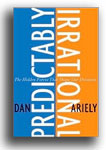Even More Tips on Predicting Irrational Consumer Behavior
by Adele Sommers
This article continues the exploration of one of the more insightful business books in many years: “Predictably Irrational: The Hidden Forces that Shape Our Decisions,” by MIT researcher and professor of behavioral economics, Dan Ariely.
 In Ariely’s decades of study of consumer decision-making, he has discovered an intriguing array of human idiosyncrasies. Gaining a deep understanding of our own peculiarities could significantly guide the way we conduct our business and marketing activities to cater to the “irrational,” but predictable, aspects of consumer behavior. In Ariely’s decades of study of consumer decision-making, he has discovered an intriguing array of human idiosyncrasies. Gaining a deep understanding of our own peculiarities could significantly guide the way we conduct our business and marketing activities to cater to the “irrational,” but predictable, aspects of consumer behavior.
A previous newsletter summarized the findings in four of about a dozen topics of Ariely’s book. This article reviews four additional areas, with findings that you could potentially apply to your own business, professional, or personal life. So, buckle up and enjoy more human irrationality!
We Peg Our Buying Expectations to Initial Reference Points
Through a series of clever experiments, Ariely observed an intriguing pattern that occurs whenever numbers of any kind are mentioned to buyers before asking them to consider purchasing an item at a certain price.
Regardless of which number is mentioned — it could be the outside temperature, an identification number, or a quantity of something — that number acts as an “anchor” and gives buyers a relative point of comparison for the very next purchase they consider making.
Examples of the anchoring effect:
 Artificially induced anchors (such as asking people to consider the last two digits of a random ID number as the price for an item that they will next be asked to consider buying) can strongly influence the highest price that they would be willing to pay for an item. Artificially induced anchors (such as asking people to consider the last two digits of a random ID number as the price for an item that they will next be asked to consider buying) can strongly influence the highest price that they would be willing to pay for an item.
The effect is this: The lower the anchor number, the lower the relative ceiling on what the buyers said they’d be willing to pay for that item. Conversely, the higher the anchor number, the higher the relative ceiling on what buyers would be willing to pay.
- Anchors take effect with new behaviors, and persist as reference points as long as people can recall their first purchase. Buying Starbucks coffee at $4 a cup may seem like an extravagance at first, but once someone begins buying it at that price, that price becomes an anchor for that type of purchase. In any case, those anchor points endure not only during the current purchase, but well into the future.
- Price tags can be anchors, too, but only if we contemplate buying at that particular price, not simply when we see a price tag.
Our Love Affair with Ownership and Possessions
 Ariely observed a phenomenon that most of us are already familiar with — we seem to have an innate tendency to become extremely attached to what we own, even if it’s currently of little or no value to us and costs us dearly to hang onto it! Ariely observed a phenomenon that most of us are already familiar with — we seem to have an innate tendency to become extremely attached to what we own, even if it’s currently of little or no value to us and costs us dearly to hang onto it!
A related behavior is that we tend to focus more on what we stand to lose (such as our precious junk) rather than what we stand to gain (such as the compensation we’ll receive from selling it). This occurs because of the very strong aversion we have to loss.
We also begin to feel partial ownership of something even before we actually buy or take possession of it. Examples include situations when we look at a catalog and imagine ourselves already owning and wearing the clothing or using the products.
We further assume that others will view a transaction from our perspective — including the feelings and memories we associate with an item we are selling. It means, for example, that we might expect buyers to overlook a cracked window in our home that’s for sale because of all of our warm associations with living there!
The Problem with Too Many Options
Ingenious experiments have shown that when offered a range of options, we try to maximize every option available to us. We also try to keep all of our options open indefinitely — even if we pay heavily in terms of time, energy, and resources.
Ariely found that we often don’t want to weigh the possibilities and settle fairly quickly on the best possible choice. Instead, we end up committing to far too many things or overspend on overly complex products (often experiencing “analysis paralysis” in the process) — just so we can have access to something we might want or need in the future.
Examples:
 Parents who shuffle kids around to too many extracurricular activities, hoping that one of those activities will spark their child’s interest or talents. Parents who shuffle kids around to too many extracurricular activities, hoping that one of those activities will spark their child’s interest or talents.
- Buying a gizmo with far more features than we would ever use, just in case one of those features might come in handy “someday.”
- People who buy an annual gym membership but don’t use it more than a couple of times. (It would be far cheaper overall to pay by the visit — but that would reduce the perceived number of options!)
How Expectations Color Our Perceptions
Ariely succinctly explains: “When we believe beforehand that something will be good ... it generally will be good — and when we think it will be bad, it will be bad.” His research in the arena of foods and beverages suggests doing the following to help set positive expectations for others:

- Offer an in-depth, mouth-watering description, such as when a caterer portrays an elaborate menu of exotic and fashionable flavors and foods to be served. Potential customers can then imagine the tastes in exquisite detail, and are more likely to select the more descriptive caterer over one with more generic-sounding fare.
- Deliver and serve the food with creative presentations and attractive packaging, and that way, it will look far more appealing than it would on ordinary tableware.
Expectations also can develop subconsciously, such as through a phenomenon known as “priming.” This technique initially exposes people to words and phrases that suggest a certain theme, which causes a subtle shift in their behavior.
For example, when subjects were “primed” by being exposed to word puzzles that subtly portrayed a retirement theme — “Florida, bingo, ancient” — they walked much more slowly down the hall afterward than those who received different priming or no priming. When subjects were primed with words like “aggressive, annoying, intrude,” they interrupted their testers much more readily than those who were primed with “honor, considerate, polite.”
In conclusion, Ariely’s brilliantly designed experiments expose our “predictably irrational” expectations, perceptions, possessions, and obsession with options.
Each revelation suggests novel ways to use the findings when designing our own business and marketing strategies.
Copyright 2022 Adele Sommers
|


